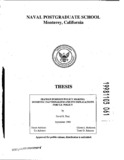FOREIGN POLICY UNDER PRESIDENT AL-SISI

Download
Author
Haddad, John
Date
2018-06Advisor
Russell, James A.
Ostovar, Afshon P.
Metadata
Show full item recordAbstract
President al-Sisi’s regional foreign policy decisions have taken a different approach compared to past Egyptian presidencies. Understanding where Egypt is headed and the backbone of al-Sisi’s foreign policies is important not only for U.S. interests in the Middle East and North Africa, but for regional security and stability. This thesis attempts to explain how and why al-Sisi makes his foreign policy decisions by examining his policies on three ongoing conflicts: the Gaza Strip, the Syrian crisis, and the Yemeni civil war. Additionally, this thesis examines and compares previous Egyptian presidents’ foreign policies with al-Sisi. Within these case studies, three hypotheses are tested: that al-Sisi’s foreign policy concentrates on protecting the regime and supporting its interests, that al-Sisi’s foreign policy concentrates on protecting national interests and improving quality of life for Egyptians, or a combination of the two. While regime and national interests differ in each case study, al-Sisi has demonstrated that he takes into account both factors in his foreign policy decision-making. The lessons learned from these case studies can assist U.S. leadership and policymakers in predicting how President al-Sisi is likely to approach new challenges in the Middle East.
Rights
This publication is a work of the U.S. Government as defined in Title 17, United States Code, Section 101. Copyright protection is not available for this work in the United States.Collections
Related items
Showing items related by title, author, creator and subject.
-
The Soviet navy and superpower foreign policy in the Middle East: a study in the political application of naval force.
Joslin, Leslie Allen (1974-11-19);Originally deployed forward in the waters of the Middle East only a decade ago to defend the Soviet homeland against Western strategic attack from the sea, the Soviet Navy, since the Six Day War of 1967 has become ... -
United States national security interests and the Repubic of Mexico.
Matos, Eric Efrain (Monterey, California. Naval Postgraduate School, 1983-06);The implications of the term "national interest" have recently been under debate among those involved in foreign policy decision making. The word "interest" derives from the Latin meaning "it concerns, it makes a difference ... -
Iranian foreign policy making : domestic factionalism and its implications for U.S. policy./ David R. Toni.
Toni, David R. (Monterey, California. Naval Postgraduate School, 1998-09);While Iranian foreign policy making since the 1979 revolution has been erratic and even hostile to the interests of the United States, it has been anything but irrational and unintelligible. This thesis argues that Iranian ...


 18Jun_Haddad_John.pdf (1.149Mb)
18Jun_Haddad_John.pdf (1.149Mb)

